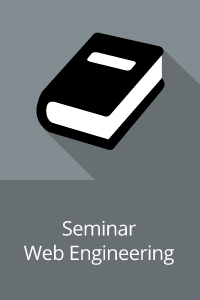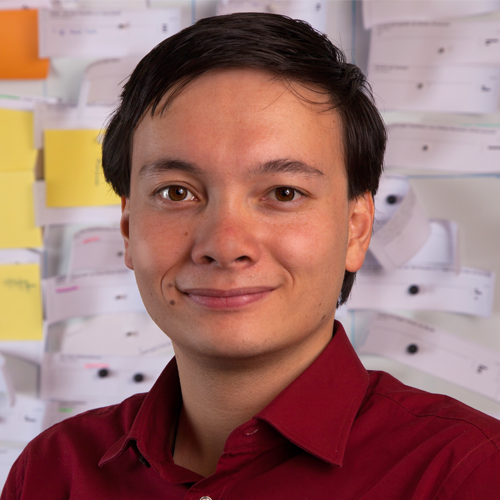
Seminar Web Engineering (WS 2016/2017)
Welcome to the homepage of the Seminar Web Engineering
This website contains all important information about the seminar, including links to available topics as well as information about the seminar process in general.
The interdisciplinary research area Web Engineering develops approaches for the methodological construction of Web-based applications and distributed systems as well as their continuous development (evolution). For instance, Web Engineering deals with the development of interoperable Web Services, the implementation of web portals using service-oriented architectures (SOA), fully accessible user interfaces or even exotic web-based applications that are voice controlled via the telephone or that are represented on TV and Radio.
The following steps are necessary to complete the seminar:
- Preparation of a presentation about the topic assigned to you.
- An additional written report of your topic.
- Each report is reviewed by two or three other particpants.
Seminar chairs



Dr.-Ing. Sebastian Heil
Contact
Participants
- Diplom Informatik (Proseminar/Hauptseminar)
- Diplom Angewandte Informatik (Proseminar/Hauptseminar)
- Bachelor Informatik (Proseminar 500110 /Hauptseminar 500070)
- Bachelor Angewandte Informatik (Proseminar 500110 / Hauptseminar 500270)
- Informatik für Sozial- und Geisteswissenschaftler (Proseminar 500110 /Forschungsseminar 500090)
- Master Data & Web Engineering (Seminar 553170 / Forschungsseminar 500090 / DWE-Seminar 553170)
- High Performance & Cloud Computing (Forschungsseminar 500090)
- Master Informatik (Forschungsseminar M_01)
- Master Web Engineering (Seminar Web Engineering 500410)
Registration
You may only participate after registration. The registration is closed. Please try again in the following semester.
Topics and Advisors
Fragen:
- What are big data analytics?
- What are the trends?
- What are the big data analytic platforms and tools?
- What are the research direction?
- Big data and web engineering?
Fragen:
- What is it?
- What can I store?
- How does it work?
- What are potential application domains, apart from Bitcoin?
Fragen:
- What is the difference to classical machine learning?
- What is Google TensorFlow?
- How can it be used in Semantic Technologies for instance for NLP (Natural Language Processing?
Fragen:
- What is it?
- What is its purpose?
- How does it work?
- What are typical use cases?
- How do they relate to each other?
- What are the respective pros and cons?
- How can linked data be supported by XML and RDF?
Fragen:
- What is Material Design?
- Who should use it and why?
- What does the Material Design Lite Language offer?
- How does it differ from Twitter Bootstrap, Angular Material Design or Google Polymer?
Fragen:
- What is it?
- How do the different concepts interact together?
- What are the advantages in comparison to tradition approaches such as LAMP or WINS architectures?
Fragen:
- Why should we talk about "offline" web technologies?
- What is the meaning of offline web applications and what are the challenges?
- What technologies are used?
- Events
- Caching/Storing
- Disconnect/Reconnect
Literatur:
- eigene Recherche notwendig
Fragen:
- What is RethinkDB?
- How RethinkDB is different from other databases and realtime sync APIs?
- How RethinkDB can be used in Applications?
Fragen:
- what are Rich Internet Applications?
- What are the Characteristics and commom platforms?
- What are the security considerations?
Fragen:
- What is Web Service Composition?
- What are common technologies and tools?
- Which standards exist?
Fragen:
- What device functions can or are planned to be accessed?
- What sensors can be accessed and how?
- Why should the Web be able to access device and sensor data?
- Use-cases?
- Privacy/Security concerns?
Literatur:
Fragen:
- What is Liquid Web Design?
- The difference between Liquid and Solid software?
- How does it differ from Responsive Web Design?
Literatur:
Fragen:
- Which services can be used in Germany to provide an online payment functionality within a WebApp?
- How do they compare to each other?
- How can they be integrated?
- What do they cost?
Fragen:
- The origin of the language?
- what are the features of the language?
- What are common use cases?
- Demo
Literatur:
Fragen:
- What is it?
- How can 360° images and videos be produced and embedded on a website?
- What are alternatives?
Seminar Opening
If you have not done this so far, please register in the VSR Seminar Workflow System.
The slides of the seminar opening are available here .
Short Presentation
In your short presentation, you will provide a brief overview on your selected topic.
This includes the following aspects:
- What is in your topic?
- Which literature sources did you research so far?
- What is your idea for a demonstration?
Hints for your Presentation
- As rule of thumb you can plan for 2 minutes per slide. Significantly more slides per minute can be difficult to perceive for the audience.
- Prior to creating your presentation, you should think about: What should be the main message of my presentation? What should the audience remember after my presentation?
Based on these considerations you should create your presentation. - Here you can find some useful hints http://www.garrreynolds.com/Presentation/
Seminar Days
Monday, 12/05/2016 15:30 - 18:45 in 1/316
Thursday, 12/08/2016 13:45 - 18:00 in 1/204
Monday, 12/12/2016 15:30 - 18:45 in 1/B006
Report
- Important Hint on Citing:
- Any statement which does neither belong to general knowledge nor stem from the author has to be provided with a reference to its original source.
- "When to Cite Sources"Good overview by Princeton University
- Examples for citations can be found in theIEEE Citation Reference
- Web References have to be cited with author, title, date, URL and date of last access. Examples:
- [...] M. Nottingham and R. Sayre. (2005). The Atom Syndication Format - Request for Comments: 4287 [Online]. Available: http://www.ietf.org/rfc/rfc4287.txt (18.02.2008).
- [...] Microsoft. (2015). Microsoft Azure Homepage [Online]. Available: http://azure.microsoft.com/ (23.09.2015).
- The url has to be included as a hyperlink ("clickable").
- Further Information and Hints:
- Please use, as far as possible, the HTML elements which are used in the template. Changes to the CSS file are not allowed and will be ignored.
- Carefully check spelling and grammar of your reports, preferably using software support such as OpenOffice, Microsoft Word or LanguateTool, before uploading it.
- Check that your HTML is valid using the W3C Validator
Review
- Each seminar participant has to review exactly three reports. The reviews are not anonymous.
- Use the review forms provided in the VSR Seminar Workflow, one per report.
- Following the review phase, each seminar participant will receive the three peer reviews of his report and, if necessary, additional comments by the advisors. You will then have one more week to improve your report according to this feedback.
- The seminar grade will consider the final report.
All comments in the reviews are for improving the text and therefore in the interest of the author.


